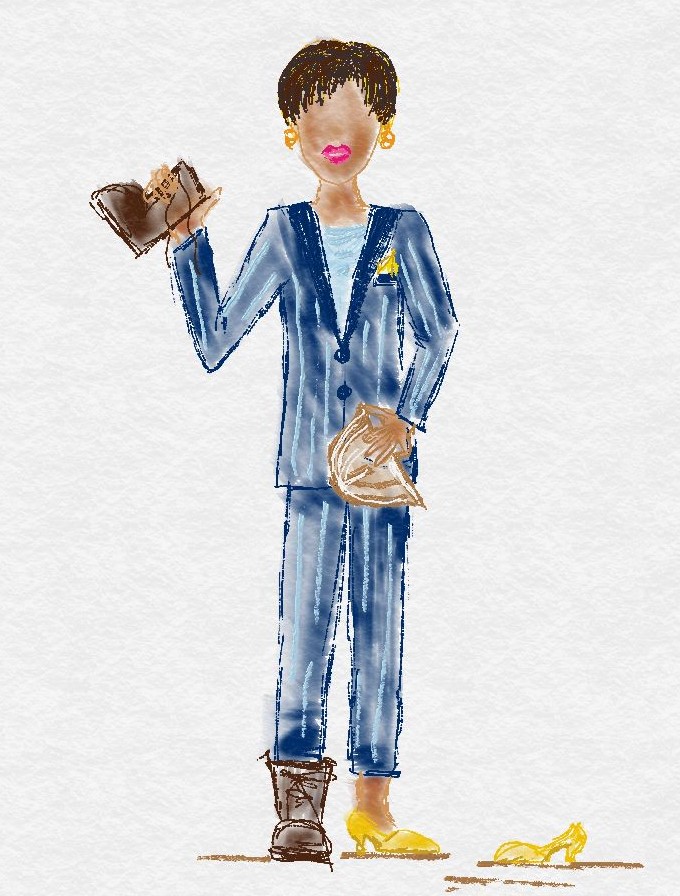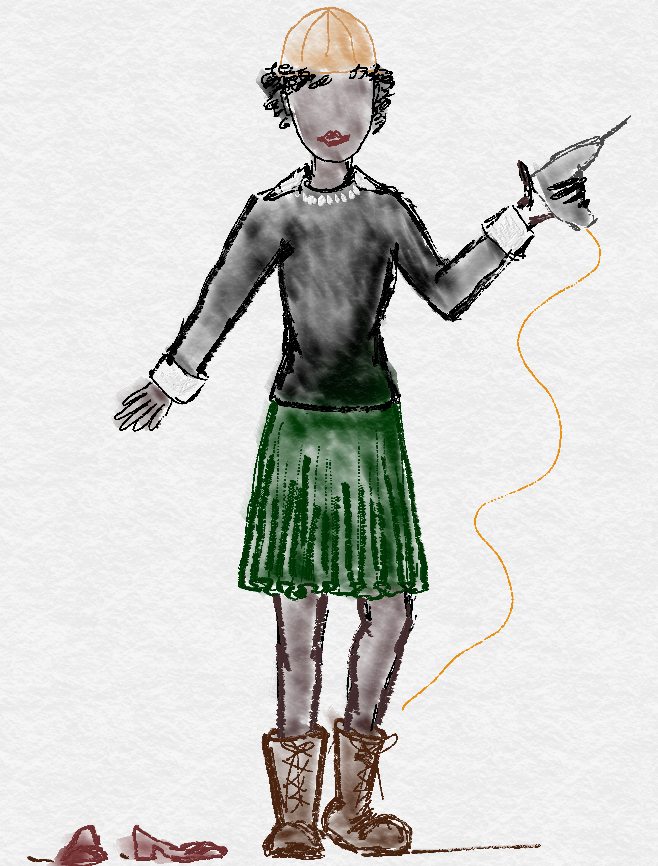job equality
Time’s Up II
Part II – Us

Previously we addressed the unsuitable behavior of some men in the workplace, and we offered guidelines for those men who were either sincerely or disingenuously unable to tell the difference between appropriate and inappropriate actions. The other variable in the equation that adds up to a happy workplace is our behavior. Yes, us, the women who are the subjects of this stramash. We may be the victims, but that does not mean we don’t have certain responsibilities in moving toward a solution to the problem.
Wait, what? Somehow the wrong attitudes and actions of other people create responsibilities for us? But we didn’t do anything. Why should we have to work to take care of a problem caused by someone else?
We have a responsibility here because this isn’t Candyland. This is real life, and we live in a world that has been evolving for about 4.54 billion years, give or take 10 to 50 million years. Every ice age, every extinction, every social change, every shift in hemlines has been a product of interdependent factors in a complex environment. You can sit on your princess throne and say that men should just change and life should just be fair. Good luck with that.
For our part, it will only help our cause if we are proactive and do everything in our power to stop the bad guys and enlighten the good guys. Sure, you could just sit around and be mad, waiting for social change to sweep across professional society like a special effect in a science fiction movie. Your desired results will take much, much longer that way, and you will be disconnected from the end result. Instead, we can all take some basic steps to help create an environment that is fair and beneficial to all of us.
1. Repeat after me, “Not all men are bad.” (Okay, you get a pass on this if some guy just broke up with you on a Post-It and you’re out drinking with your girlfriends). It’s funny, because even most guys I know will say, “Men are pigs.” The implication is that men are led around by their baser instincts and, therefore, will always be low quality humans who make bad decisions. But that’s just not true. Even from a statistical standpoint, it is highly unlikely that 49% of 7 billion people would ALL have sub-par character. And assuming that all men are bad is a negative attitude that will ill prepare you for helping your co-workers and bosses and clients evolve into more enlightened colleagues. Saying that all men are bad is a defeatist attitude that will not move us forward even an inch (or a centimeter for our Canadian and European readers).
2. We have to be aware of our own behavior and how it affects the perception of the men around us. I will admit that I sometimes have difficulties with this. I am a toucher – if you’ve met me, I’ve probably hugged you. I routinely grasp the nearest person’s arm to make a point, and I’ll squeeze a colleague around the shoulders to offer congratulations. I have learned that this sometimes generates confusion with my male colleagues. Yes, I’m proud of you for getting that journal article published, but no, I don’t intend to sleep with you as an attaboy. Unfortunately, many men will admit that they are less than adept at reading subtle signs and differentiating between behavior types in various situations. Simply put, some guys think you must want to sleep with them because you squeezed their arms. They are not pigs, they’re just…clueless. It has taken me awhile, but I have learned that I need to be more restrained in many situations to avoid confusion. It doesn’t mean I have to be cold and unfriendly, I just have to pay more attention to men’s reactions and err on the safe side until I feel like I know someone well. This doesn’t mean I’m being unduly burdened, it just means I’m being a responsible adult.
It goes without saying that flirting on the job will broadcast the idea that you might be receptive to inappropriate actions. Certainly, no means no. But you can avoid the pothole more easily if you don’t steer the car in that direction.
3. We have to speak up every time. Sometimes we endure an ugly situation and we emerge unscathed. The temptation is to let well enough alone and move on. Say your boss got physical with you, you gave him what-for, and now he’s acting respectful and giving you a wide berth. You consider just chalking it up to a bad memory and never speaking of it again. But what about the next woman? Maybe she’s not as brave as you are. Maybe she has four kids at home and she’s petrified she’ll lose her job. So the boss just moves on to harassing her. When she finally gets up the nerve to blow the whistle, the supporting evidence you have that would have helped her establish a pattern of behavior isn’t there. Management doubts her claim, because they usually do at first, and when you finally come forward, HR says, “If this really happened, why didn’t you complain?” When you say that the issue was solved, people inevitably look at the other woman and say, “Why didn’t you just do what she did?” Everyone becomes distracted from the fact that what the guy has been doing is WRONG. We need to address bad behavior every time.
It should be noted that at some point in time your justifiable whistle blowing most likely will result in an accusation that you’re just a whiner. You’re too sensitive. You caused the problem. Or, my favorite, you’re just hard to work with. Almost every woman in our field over the age of 30 has been told this at some point because she made public some guy’s bad behavior. I wish I could say don’t worry about it, it won’t happen. But it will, so you have to tell yourself in advance that you’re doing the right thing, and you’re a delightful person. No one can make you feel bad about yourself if you don’t let them.
4. We must always use our power for good. On the opposite side of justifiable whistle blowing is using sexual harassment as a tool to get back at a man with whom you have a personal dispute. Just like sexual harassment, false accusations are wrong. Ruining a man’s reputation because you don’t like him is wrong. Claiming sexual wrongdoing when a workplace romance goes horribly awry is wrong.
I once worked with a woman who actively pursued one of the engineers with the company, even seducing him at his desk after hours. When the short-lived affair went south, she got angry with the engineer and went to the boss to say that she was offended that Playboy magazines were kept in the men’s restroom by this engineer. She felt sexually harassed by this. Obviously, her campaign was personal, and I didn’t back her up when the boss asked me if I also felt compromised. She was furious with me, but I told her that her claim would make it difficult the next time a real problem happened.
This list is not comprehensive, because the best defense is a great offense. But probably our biggest responsibility in our very complicated campaign to rid the workplace of sexual inequalities is our need to support our sisters. This does not mean you have to agree with every opinion of every woman you know, and we don’t all have to be friends. But when another woman needs support, whether it be help reporting a problem or a sympathetic ear to try to figure out how to deal with a difficult boss, you owe it to YOURSELF to give her whatever she needs. The military doesn’t teach the infantry to stick together just to promote good social skills. Don’t ever leave anyone behind and you won’t get left behind.
I Am Not One of the Boys
Sometimes Being Tough Means Being Stupid

There are a number of milestones most women will experience if they undertake a career in a field populated mainly by men. At some point, you will get singled out in a very conspicuous situation (important meeting, large construction site) for being the only female within miles and will be asked to give relationship advice. Somewhere down the line, you will be the object of someone’s unwanted affection, creating an uncomfortable professional situation with potentially negative career implications. More than once, you will have “female problems” at a very inopportune time. (Group cringe here). And in response to some random occurrence, you will feel the need to act as if you are never treated differently, and you will assert that you are too tough to let any little sexism bother you. You might as well be one of the guys, right?
I wish I could say a) I’ve never done this and b) I’m too young to see the problem with this response. Alas, I can claim neither. Much like most of you, some experience(s) in my past caused me to act as if all was well and the screaming bad behavior of those around me wasn’t a problem. Many mistakes later, I wish I had been honest and dealt with the situations as they were, rather than how I wished they were. My “toughness” did no one any good and undermined my professional progress as a whole.
To be clear, I am a highly empathetic and sympathetic person, but I have no stomach for high maintenance behavior and whining. I think trophies should go to those who earn them, and most people don’t understand the value of hard work. Everyday life is not a Hallmark card; that’s why they make those cards to commemorate the moments that are. And even those who love their jobs don’t wake up every morning singing with a chorus of forest animals and dreaming of the two-hour conference call to come. If life isn’t challenging you don’t learn anything, and if you think only about yourself, you live your life with the maturity of a seventh grader.
On the other hand, to ignore obstructive conditions in the workplace is not being tough and growing, it’s being counterproductive and inefficient. Many of us have felt at some point like it was time to “suck it up” and just proceed as if the sexist old draftsman isn’t doing all of your projects last because he doesn’t think you should be there or the contractor isn’t spending so much time looking down your shirt that he’s not listening to you telling him THE SHAFT BOTTOMS AREN’T CLEAN ENOUGH. We have told ourselves the conditions at hand were just there as a rite of passage, and it will all get better once the people involved see that we’re competent. Often, someone else will be telling us that we would make life easier for ourselves if we didn’t mention any problems we have and just act like one of the guys. But we’re not. And to evaluate things dishonestly is illogical and very un-engineerlike. Nothing – not the project, not your company, and certainly not your life – will benefit from evaluating conditions as they might be, instead of how they are. And your dishonesty about who you are will have long range consequences.
Shortly after I opened my company, an architect I knew got me hired to do special inspections at a state prison project. I was thrilled for the work, and I ignored the architect’s history of flirting beyond the line of appropriateness. The benefit to my new business outweighed any perceived discomfort on the job.
I had worked on a number of prison projects, and I was familiar with typical protocols for ongoing work at an existing facility. However, the architect said this project was a bit different and that he wanted to visit the site with me for the first inspection to make sure all was well. The site was three hours away, and he insisted on riding together so he could brief me on the way. He was formal and appropriate on the drive down, so I assumed all would be well.
When we arrived at the site, I found out the project was being constructed with prison labor. I was escorted to the area in question by six guards with rifles, plus the warden. Although I was surrounded by 25 prisoners with tools, I had plenty of protection, so my initial misgivings evaporated and I was grateful for a hopefully profitable project.
We had no sooner left the prison grounds when the architect surprised me with his plans for a tryst at a local motel, followed by a “nice lunch” at a nearby greasy spoon. (How could I say no when chicken fried steak was being offered?) I was furious, and I told him we were going home NOW. He grumbled and whined for three hours.
I hope you have enough faith in me to know that I drove to the next inspection by myself. When I arrived at the prison, the puzzled guard at the gate told me the warden was gone for the day and they had no one scheduled to escort me. He said they could spare a guard to walk me back to the site, but that I would have to just stick with the guard/superintendent who was in charge of the jobsite after that. Seriously?
This is the point when I should have said no. This is a prison. These men are incarcerated, and they have tools. No person with any sense would send a 30-year old female into a construction site with 25 felons and only one guard. But I couldn’t stand the idea that someone would say the inspection didn’t get done just because I was a female. So I said, “Sure. Okay, let’s go.” The guard who was the site superintendent was furious and cussed the escort guard a blue streak. I finished my inspections (mostly), but I finally left the site when a small, heavily scarred man started walking around me in circles, muttering and slamming a hammer into his palm.
I found out later that after I turned him down, the architect told the prison board that I didn’t need so much protection because I was a “tough girl.” He also purposefully didn’t tell the warden I would be on-site that day. The warden went ballistic when he found out I was at the site with so little protection, and one guard lost his job.
Did I get the job done? Yes. But the risk to me, (and the risk of a riot and injuries the warden told me), was not commensurate with the product. Being able to measure mortar proportions on that job did not prove that I was a good engineer and did prove that my judgment might be questionable. In fact, I had let my emotions (pride and stubbornness) override my stewardship of the best interest of the project.
There are many degrees of femininity, and some women will blend into an environment that is mostly male with more ease than others. But that ease should not be equated with being a better engineer/contractor/equipment salesperson/sword swallower. I am NOT one of the boys and I never will be. But I’m a damn good engineer.


